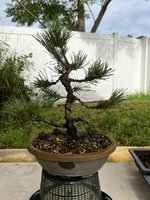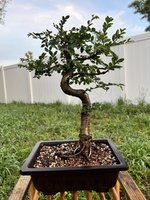billfromtheboot
Seedling
- Messages
- 13
- Reaction score
- 14
My ten year old son cut off two branches on my Japanese black pine, (and I can’t be angry with him, because I have encouraged him to get into the art) but it’s the wrong time of year. Does it need to be kept in the shade for about a month, or is that just after repotting. I told him this morning that this tree, my bald cypress, and the crepe Myrtle are off limits, and he understand now, but man, I almost lost it.  He didn’t do a bad job though. Btw, it’s simply a pre-bonsai at this point. I always get mixed responses. I would think shading the tree will ultimately weaken it. I added more biogold and in hopes to help it recover. Thanks ahead.
He didn’t do a bad job though. Btw, it’s simply a pre-bonsai at this point. I always get mixed responses. I would think shading the tree will ultimately weaken it. I added more biogold and in hopes to help it recover. Thanks ahead.


